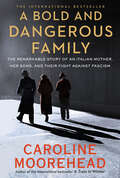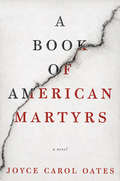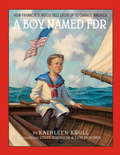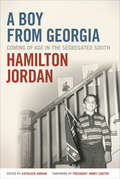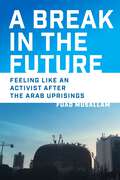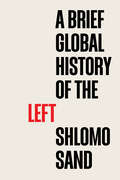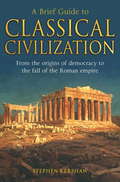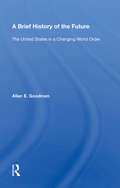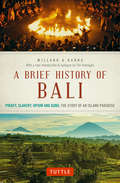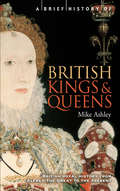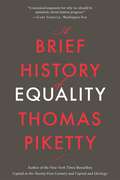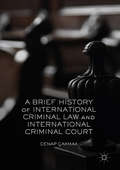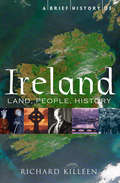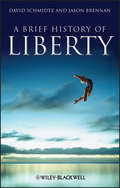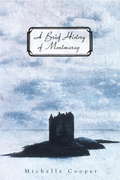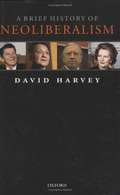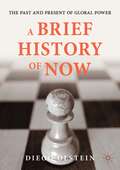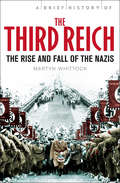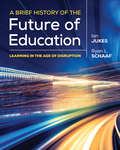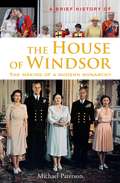- Table View
- List View
A Bold and Dangerous Family: The Remarkable Story of an Italian Mother, Her Sons, and Their Fight Against Fascism
by Caroline MooreheadFrom the bestselling author of A Train in Winter, the story of the Rosselli family, whose courage standing up to Mussolini's fascism helped define the path of Italy in the years between the World Wars."I had a house: they destroyed it. I had a newspaper: they closed it. I had a university chair: I was forced to abandon it. I had--as I still do--dreams, dignity, ideals: to defend them I was sent to prison. I had teachers: they murdered them." --Carlo Rosselli on Italy's fascist regime Italy's Rosselli family were members of the cosmopolitan, cultural elite in Florence at the start of the 20th century. Led by their fierce matriarch, Amelia Rosselli, they were also vocal anti-fascists. As Mussolini rose to power in Italy following WWI, the Rossellis took leading roles in the rebellion against him, a stance that few in their class would risk. And when Mussolini established a police state whose tactics grew more brutal, the Rossellis and their anti-fascist friends transformed from debaters and critics into activists. As punishment for their participation in revolutionary activities, the Rossellis' homestead was ransacked, one after another of their number was imprisoned, others in the family fled the country to escape a similar fate, and two were eventually assassinated on the orders of Mussolini's government. After the outbreak of WWII, Amelia fled with the remaining members of the Rosselli family to New York City. Their visas were arranged by Eleanor Roosevelt herself. Through the stories of these brave people and their friends, renowned historian Caroline Moorehead delivers an immersive picture of Italy in the first half of the 20th century. She reveals the rise and fall of Mussolini and his black-shirted Squadristi; the ambivalence of many prominent Italian families to Mussolini and their seduction by his promises; and the bold, fractured anti-fascist movement, so many of whose members died at Mussolini's hands. Continuing "The Resistance Quartet" she began with A Train in Winter and continued with Village of Secrets, Moorehead once again shows us the faces of those who helped the world hold on to its humanity at a time when it seemed all might be lost.
A Book of American Martyrs: A Novel
by Joyce Carol Oates“Oates’ American saga captivates because it exists within an actual drama playing out across the country...Martyrs is a graceful and excruciating story of two families who do not live very far apart, but exist in different realities. ” --USA Today, 4-star review“Successful because [Oates] refuses to satirize or dehumanize anyone, even murderous foes of abortion...With its wrath and violence, A Book of American Martyrs offers this teaspoon of warmth in these troubled times: that it is possible to be wrong without surrendering your humanity.” --Los Angeles Times“The most relevant book of Oates’s half-century-long career, a powerful reminder that fiction can be as timely as this morning’s tweets but infinitely more illuminating.” --Washington PostA powerfully resonant and provocative novel from American master and New York Times bestselling author Joyce Carol Oates In this striking, enormously affecting novel, Joyce Carol Oates tells the story of two very different and yet intimately linked American families. Luther Dunphy is an ardent Evangelical who envisions himself as acting out God’s will when he assassinates an abortion provider in his small Ohio town while Augustus Voorhees, the idealistic but self-regarding doctor who is killed, leaves behind a wife and children scarred and embittered by grief. In her moving, insightful portrait, Joyce Carol Oates fully inhabits the perspectives of two interwoven families whose destinies are defined by their warring convictions and squarely-but with great empathy-confronts an intractable, abiding rift in American society. A Book of American Martyrs is a stunning, timely depiction of an issue hotly debated on a national stage but which makes itself felt most lastingly in communities torn apart by violence and hatred.
A Book of Conquest
by Manan Ahmed AsifManan Ahmed Asif shows that the Chachnama is a sophisticated work of political theory, embedded in both the Indic and Islamic ethos. His social and intellectual history of this text offers an important corrective to the divisions between Muslim and Hindu that so often define Pakistani and Indian politics today.
A Boy Named FDR: How Franklin D. Roosevelt Grew Up to Change America
by Kathleen Krull Steve Johnson Lou FancherFranklin D. Roosevelt was born into one of the wealthiest families in America, yet this ultimate rich kid grew up to do more for ordinary Americans than any other president. <P><P>This appealing picture book biography shows how, from childhood on, FDR was compassionate, cheerful, determined, and enormously likable. Though he had private tutors as a young boy and later attended an elite boys' school, he played pranks and had down-to-earth fun just like any boy today. <P><P>Kathleen Krull's animated picture book biography focuses on FDR's childhood years through his entry as a young man into politics and his battle with polio. A summary of his achievements as president and a chronology of his life are included. The well-researched text and the evocative illustrations by Steve Johnson and Lou Fancher provide an inspiring introduction to one of our greatest presidents.
A Boy from Georgia: Coming of Age in the Segregated South (A\bradley Hale Fund For Southern Studies Publication)
by Hamilton Jordan&“The story of a young man waking to the fact that his family is on the wrong side of history.&”—Atlanta Journal-Constitution When Hamilton Jordan died in 2008, he left behind a mostly finished memoir. His daughter, Kathleen—with the help of her brothers and mother—took up the task of editing and completing the book. A Boy from Georgia—the result of this posthumous father-daughter collaboration—chronicles Hamilton Jordan&’s childhood in Albany, Georgia, charting his moral and intellectual development as he gradually discovers the complicated legacies of racism, religious intolerance, and southern politics, and affords his readers an intimate view of the state&’s wheelers and dealers. Jordan&’s middle-class childhood was bucolic in some ways and traumatizing in others. As Georgia politicians battled civil rights leaders, a young Hamilton straddled the uncomfortable line between the southern establishment to which he belonged and the movement in which he believed. Fortunate enough to grow up in a family that had considerable political clout within Georgia, Jordan eventually became a key aide to Jimmy Carter and was the architect of Carter&’s stunning victory in 1976, later serving as his chief of staff. Clear-eyed about the triumphs and tragedies of Jordan&’s beloved home state and region, A Boy from Georgia tells the story of a remarkable life in a voice that is witty, vivid, and honest. &“A delightful and inspiring coming-of-age story brimming with funny anecdotes, family mysteries, and political intrigue.&”—Hank Klibanoff, coauthor of The Race Beat: The Press, the Civil Rights Struggle, and the Awakening of a Nation
A Break in the Future: Feeling Like an Activist After the Arab Uprisings
by Fuad MusallamInvestigates how Lebanese activists work through failure to keep the possibility of political change aliveA Break in the Future considers how activists keep hope alive and work toward future change when social movements fall apart and protests fail. Anthropologist Fuad Musallam investigates the endurance of political possibility in Beirut, Lebanon, between the Arab uprisings of 2010–11 and the Lebanese uprising of October 2019. Despite a regional collapse of political hope and a local inability to effect change in the context of political stasis, postponed elections, and the degradation of civil infrastructure, between every protest cycle a sizable number of people remained engaged and built toward future political opportunities. Through an analysis of activist strategies, Musallam explores the ways in which we grasp different phases of political (dis)engagement together. The book is motivated by a desire to better understand how to keep political possibility alive.To make sense of how possibility endures, this book looks at the ebb and flow of political engagement together, that is, not only at the peaks of recent mobilizations but also at the times in between when, at first glance, little seems to be happening on the ground. Musallam explores how activists cultivated and maintained their political subjectivity—the active and engaged sense of self that motivates political action—across the decade’s high and low points. He finds this political subjectivity to be the product of heartbreak and defeat as much as victory, as it underlies several movements at any one time and can sustain activists through multiple setbacks.Musallam discovers that when political change seems most unlikely, a moment of rupture—or a “break in the future”—becomes central to Lebanese activists’ belief that their actions can and will transform their world. A Break in the Future ultimately argues that the experience of moments of rupture radically transforms what seems possible, and that the cultivation of these experiences keeps movements going even when things appear to fall apart.
A Brief Global History of the Left
by Shlomo SandWhat is happening to the Left? It seems to be dying a slow death. While many commentators have predicted its demise, the Left has always defied these bleak prognoses and risen from the ashes in the most unexpected ways. Nevertheless, we are witnessing today a global decline in organized movements on the Left, and while social struggles continue to challenge dominant political regimes, these efforts do not translate into support for traditional left parties or into the creation of dynamic movements on the Left. Bestselling historian Shlomo Sand argues that the global decline of the Left is linked to the waning of the idea of equality that has united citizens in the past and inspired them to engage in collective action. Sand retraces the evolution of this idea in a wide-ranging account that includes the Diggers and Levellers of seventeenth-century England; the French Revolution; the birth of anarchism and Marxism; the decolonial, feminist, and civil rights revolts; and the left-wing populism of our time. In piecing together the thinkers and movements that built the Left over centuries, Sand illuminates the global and transnational dynamics which pushed them forward. He outlines how they shaped the notion of equality, while also analysing how they were confronted by its material reality, and the lessons that they did – or did not – draw from this. This concise and magisterial history of the Left will appeal to anyone interested in the idea of equality and the fate of one of the most important movements that has shaped the modern world.
A Brief Guide to Classical Civilization (Brief Histories)
by Dr Stephen P. KershawA general introduction to the classical world from its origins to the fall of the Roman Empire. The book focuses on questions of how we know about Classical civilization from archaeology and history; deals with the Mycenaean era and the world of Myth and Epic in Homer's Iliad & Odyssey; gives an outline of Greek history in the 5th & 4th Centuries BC; looks at Greek social life and the alternative model of Sparta, and considers the achievements of the Greeks in their art and architecture, tragedy and comedy. Turning to Rome, it engages with Roman history, the Roman Epic tradition, the fascinating features of Roman social life, analyses Roman satire, explores the urban environment in Pompeii and Herculaneum, and concludes with the End of Rome.
A Brief History Of The Future: The United States In A Changing World Order
by Allan E. GoodmanThis book provides a representation of a world in which none of us have lived and of its potential dynamics. It looks at the interaction of tendencies such as democratization, technological expansion, regional integration, and the obsolescence of war, and discusses U.S. role in changing world order.
A Brief History of Bali: The Story of a Pacific Paradise
by Willard A. Hanna Tim HanniganThis book tells the story of Bali-the "paradise island of the Pacific"-its rulers and its people, and their encounters with the Western world.Bali is a perennially popular tourist destination. It is also home to a fascinating people with a long and dramatic history of interactions with foreigners, particularly after the arrival of the first Dutch fleet in 1597. In this first comprehensive history of Bali, author Willard Hanna chronicles Bali through the centuries as well as the islanders' current struggle to preserve their unique identity amidst the financially necessary incursions of tourism.Illustrated with more than forty stunning photographs, A Brief History of Bali is a riveting tale of one ancient culture's vulnerability-and resilience-in the modern world.
A Brief History of British Kings & Queens (Brief History)
by Mike AshleyHere is the whole of recorded British royal history, from the legendary King Alfred the Great onwards, including the monarchies of England, Scotland, Wales and the United Kingdom for over a thousand years. <P><P>Fascinating portraits are expertly woven into a history of division and eventual union of the British Isles - even royals we think most familiar are revealed in a new and sometimes surprising light. This revised and shortened edition of The Mammoth Book of British Kings & Queens includes biographies of the royals of recorded British history, plus an overview of the semi-legendary figures of pre-history and the Dark Ages - an accessible source for students and general readers.
A Brief History of Equality
by Thomas PikettyThe world’s leading economist of inequality presents a short but sweeping and surprisingly optimistic history of human progress toward equality despite crises, disasters, and backsliding. A perfect introduction to the ideas developed in his monumental earlier books. It’s easy to be pessimistic about inequality. We know it has increased dramatically in many parts of the world over the past two generations. No one has done more to reveal the problem than Thomas Piketty. Now, in this surprising and powerful new work, Piketty reminds us that the grand sweep of history gives us reasons to be optimistic. Over the centuries, he shows, we have been moving toward greater equality. Piketty guides us with elegance and concision through the great movements that have made the modern world for better and worse: the growth of capitalism, revolutions, imperialism, slavery, wars, and the building of the welfare state. It’s a history of violence and social struggle, punctuated by regression and disaster. But through it all, Piketty shows, human societies have moved fitfully toward a more just distribution of income and assets, a reduction of racial and gender inequalities, and greater access to health care, education, and the rights of citizenship. Our rough march forward is political and ideological, an endless fight against injustice. To keep moving, Piketty argues, we need to learn and commit to what works, to institutional, legal, social, fiscal, and educational systems that can make equality a lasting reality. At the same time, we need to resist historical amnesia and the temptations of cultural separatism and intellectual compartmentalization. At stake is the quality of life for billions of people. We know we can do better, Piketty concludes. The past shows us how. The future is up to us.
A Brief History of Fascist Lies
by Federico FinchelsteinIn this short companion to his book From Fascism to Populism in History, world-renowned historian Federico Finchelstein explains why fascists regarded simple and often hateful lies as truth, and why so many of their followers believed the falsehoods. Throughout the history of the twentieth century, many supporters of fascist ideologies regarded political lies as truth incarnated in their leader. From Hitler to Mussolini, fascist leaders capitalized on lies as the base of their power and popular sovereignty.This history continues in the present, when lies again seem to increasingly replace empirical truth. Now that actual news is presented as "fake news" and false news becomes government policy, A Brief History of Fascist Lies urges us to remember that the current talk of "post-truth" has a long political and intellectual lineage that we cannot ignore.
A Brief History of Fascist Lies
by Federico Finchelstein"There is no better book on fascism's complex and vexed relationship with truth."—Jason Stanley, author of How Fascism Works: The Politics of Us and Them In this short companion to his book From Fascism to Populism in History, world-renowned historian Federico Finchelstein explains why fascists regarded simple and often hateful lies as truth, and why so many of their followers believed the falsehoods. Throughout the history of the twentieth century, many supporters of fascist ideologies regarded political lies as truth incarnated in their leader. From Hitler to Mussolini, fascist leaders capitalized on lies as the base of their power and popular sovereignty. This history continues in the present, when lies again seem to increasingly replace empirical truth. Now that actual news is presented as "fake news" and false news becomes government policy, A Brief History of Fascist Lies urges us to remember that the current talk of "post-truth" has a long political and intellectual lineage that we cannot ignore.
A Brief History of International Criminal Law and International Criminal Court
by Cenap ÇakmakThis book offers a historical presentation of how international criminal law has evolved from a national setting to embodying a truly international outlook. As a growing part of international law this is an area that has attracted growing attention as a result of the mass atrocities and heinous crimes committed in different parts of the world. Çakmak pays particular attention to how the first permanent international criminal court was created and goes on to show how solutions developed to address international crimes have remained inadequate and failed to restore justice. Calling for a truly global approach as the only real solution to dealing with the most severe international crimes, this text will be of great interest to scholars of criminal justice, political science, and international relations.
A Brief History of Ireland (Brief Histories)
by Richard KilleenFrom the dawn of history to the decline of the Celtic Tiger - how Ireland has been shaped over the centuries.Ireland has been shaped by many things over the centuries: geography, war, the fight for liberty. A Brief History of Ireland is the perfect introduction to this exceptional place, its people and its culture.Ireland has been home to successive groups of settlers - Celts, Vikings, Normans, Anglo-Scots, Huguenots. It has imported huge ideas, none bigger than Christianity which it then re-exported to Europe after the fall of the Roman Empire. In the Tudor era it became the first colony of the developing English Empire. Its fraught and sometimes brutal relationship with England has dominated its modern history. Killeen argues that religion was decisive in all this: Ireland remained substantially Catholic, setting it at odds with the larger island culturally, religiously and politically. But its own culture and identity have stayed strong, most obviously in literature with a magnificent tradition of writing from the Book of Kells to the modern masters: Joyce, Yeats, Beckett and Heaney.
A Brief History of Liberty
by Jason Brennan David SchmidtzThrough a fusion of philosophical, social scientific, and historical methods, A Brief History of Liberty provides a comprehensive, philosophically-informed portrait of the elusive nature of one of our most cherished ideals.Offers a succinct yet thorough survey of personal freedomExplores the true meaning of liberty, drawing philosophical lessons about liberty from historyConsiders the writings of key historical figures from Socrates and Erasmus to Hobbes, Locke, Marx, and Adam SmithCombines philosophical rigor with social scientific analysisArgues that liberty refers to a range of related but specific ideas rather than limiting the concept to one definition
A Brief History of Montmaray
by Michelle Cooper“There’s a fine line between gossip and history, when one is talking about kings. ” Sophie Fitzosborne lives in a crumbling castle in the tiny island kingdom of Montmaray with her eccentric and impoverished royal family. When she receives a journal for her sixteenth birthday, Sophie decides to chronicle day-to-day life on the island. But this is 1936, and the news that trickles in from the mainland reveals a world on the brink of war. The politics of Europe seem far away from their remote island—until two German officers land a boat on Montmaray. And then suddenly politics become very personal indeed. A Brief History of Montmarayis a heart-stopping tale of loyalty, love, and loss, and of fighting to hold on to home when the world is exploding all around you. “Once in a while, a special book will cross our paths and make us grateful for life and the ability to read. I’m talking aboutA Brief History of Montmarayby Michelle Cooper. I’m calling her Australia’s next stroke of literary brilliance. ”—Viewpoint From the Hardcover edition.
A Brief History of Neoliberalism
by David HarveyNeoliberalism - the doctrine that market exchange is an ethic in itself, capable of acting as a guide for all human action - has become dominant in both thought and practice throughout much of the world since 1970 or so. Its spread has depended upon a reconstitution of state powers such that privatization, finance, and market processes are emphasized. State interventions in the economy are minimized, while the obligations of the state to provide for the welfare of its citizens are diminished. David Harvey, author of 'The New Imperialism' and 'The Condition of Postmodernity', here tells the political-economic story of where neoliberalization came from and how it proliferated on the world stage. While Thatcher and Reagan are often cited as primary authors of this neoliberal turn, Harvey shows how a complex of forces, from Chile to China and from New York City to Mexico City, have also played their part. In addition he explores the continuities and contrasts between neoliberalism of the Clinton sort and the recent turn towards neoconservative imperialism of George W. Bush. Finally, through critical engagement with this history, Harvey constructs a framework not only for analyzing the political and economic dangers that now surround us, but also for assessing the prospects for the more socially just alternatives being advocated by many oppositional movements.
A Brief History of Now: The Past and Present of Global Power
by Diego OlsteinExploring the rise and fall of global power from the mid-nineteenth century, this book tracks the long and interrelated trajectories of the most serious challenges facing the world today. Although at first the urgency of the coronavirus outbreak in 2020 seemed to take precedence over other global problems such as socioeconomic inequality and climate change, it has ultimately exacerbated these issues and created opportunities to address them boldly and innovatively. A Brief History of Now provides a bird’s-eye view of world hegemony, economic globalization and political regimes as they have evolved and developed over the last two hundred years, providing context and insights into the forces which have shaped the Western world. Presented in an accessible and engaging narrative, the book addresses key contemporary challenges and explores the repercussions of a technological revolution, the potential instability of democracy over the coming years, and the urgent struggle to tackle climate change. With his book, Diego Olstein helps to answer pressing questions about our world today and provides a roadmap for analysing future trajectories.
A Brief History of Schooling in the United States: From Pre-Colonial Times to the Present (The Cultural and Social Foundations of Education)
by Edward JanakThis book presents a sweeping overview of the historical and philosophical foundations of schooling in the United States. Beginning with education among the indigenous peoples of the Americas and going on to explore European models of schooling brought into the United States by European colonists, the author carefully traces the arc of educational reform through major episodes of the nation’s history. In doing so, Janak establishes links between schools, politics, and society to help readers understand the forces impacting educational policy from its earliest conception to the modern day. Chapters focus on the philosophical, political, and social concepts that shaped schooling of dominant and subcultures in the United States in each period. Far from being merely concerned with theoretical foundations, each chapter also presents a snapshot of the “nuts and bolts” of schooling during each period, examining issues such as pedagogical devices, physical plants, curricular decisions, and funding patterns.
A Brief History of The Third Reich: The Rise and Fall of the Nazis (Brief Histories)
by Martyn WhittockThe abuse of power, genocide, the destruction of total war, unimaginable cruelty and the suffering of millions were all central features of Hitler's Nazi regime. Yet the Nazis were also highly successful in manipulating images and information: they mobilized and engaged vast numbers of people, caught the imagination of the young and appeared remarkably modern to many contemporary observers.Was the Third Reich a throwback to a mythical past or a brutally modern and technologically advanced state? Was Hitler a strong dictator who achieved his clear goals, or was his chaotic style of government symptomatic of a weak dictator, unable to control the complex and contradictory forces that he had unleashed? Was the Third Reich ruled by terror, or largely supported by a compliant German population? Was the genocide against the Jews a peculiarly German phenomenon, or a uniquely German expression of a terrible wider trend?Whittock explores these and other key questions, interrogating the views of different historians and drawing on a wealth of primary sources - from state-sponsored art to diaries, letters and memoirs of both perpetrators and victims - to provide an overview of the complex evidence. History should aim to put us firmly in touch with the lives of people living in the past and the issues they faced. Whittock never loses sight of the individuals whose lives were caught up in these extraordinary events, while also giving a lucid overview of the bigger picture.
A Brief History of the Future of Education: Learning in the Age of Disruption
by Ian Jukes Ryan L. SchaafThe Future Tense of Teaching in the Digital Age The digital environment has radically changed how and what students need and want to learn, but have we radically changed how we deliver education? Are educators shifting and adapting or stuck in the traditional That’s the Way We’ve Always Done It world? In this book, educators will be challenged to take action and adapt to a split-screen classroom--thinking and acting to accommodate today’s learners versus allowing traditional practices by default. Written with a touch of humor and a choose-your-own-adventure approach, the authors built chapters to be skimmed, scoured or searched for interesting, relevant or required material. Readers will be able to jump in where it serves them best. Consider predictions about what learning will look like in the future. Understand and learn to leverage nine core learning attributes of digital generations. Discover ten critical roles educators can embrace to remain relevant in the digital age. Keep things simple, concentrate on how learners learn, and change your approach from present to future tense.
A Brief History of the Future of Education: Learning in the Age of Disruption
by Ian Jukes Ryan L. SchaafThe Future Tense of Teaching in the Digital Age The digital environment has radically changed how and what students need and want to learn, but have we radically changed how we deliver education? Are educators shifting and adapting or stuck in the traditional That’s the Way We’ve Always Done It world? In this book, educators will be challenged to take action and adapt to a split-screen classroom--thinking and acting to accommodate today’s learners versus allowing traditional practices by default. Written with a touch of humor and a choose-your-own-adventure approach, the authors built chapters to be skimmed, scoured or searched for interesting, relevant or required material. Readers will be able to jump in where it serves them best. Consider predictions about what learning will look like in the future. Understand and learn to leverage nine core learning attributes of digital generations. Discover ten critical roles educators can embrace to remain relevant in the digital age. Keep things simple, concentrate on how learners learn, and change your approach from present to future tense.
A Brief History of the House of Windsor: The Making Of A Modern Monarchy
by Michael PatersonThe British monarchy may be over a thousand years old, but the House of Windsor dates only from 1917, when, in the middle of the First World War that was to see the demise of the major thrones of continental Europe, it rebranded itself from the distinctly Germanic Saxe-Coburg-Gotha to the homely and familiar Windsor. By redefining its loyalties to identify with its people and country rather than the princes, kings and emperors of Europe to whom it was related by birth and marriage, it set the monarchy on the path of adaptation, making itself relevant and allowing it to survive. Since then, the fine line trodden by the House of Windsor between ancient and modern, grandeur and thrift, splendour and informality, remoteness and accessibility, and influence and neutrality has left it more secure and its appeal more universal today than ever.
